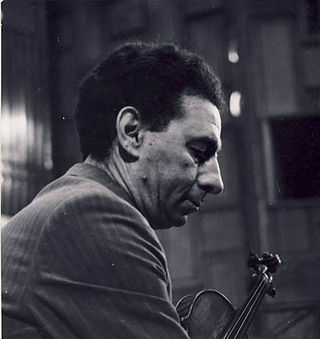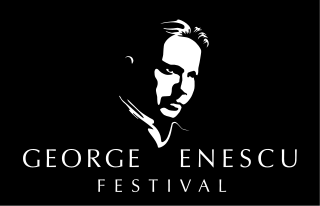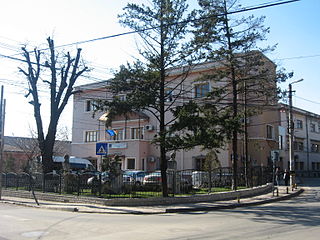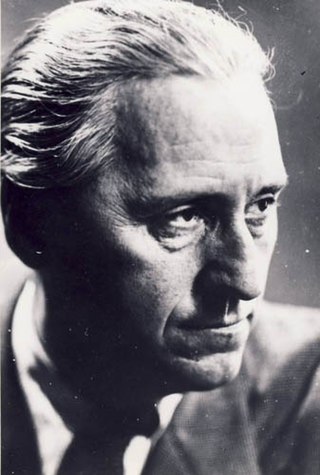Related Research Articles
Constantin-Nicolae Silvestri was a Romanian conductor and composer.

Constantin "Dinu" Lipatti was a Romanian classical pianist and composer whose career was cut short by his death from effects related to Hodgkin's disease at age 33. He was elected posthumously to the Romanian Academy. He composed few works, all of which demonstrated a strong influence from Bartok.

George Enescu, known in France as Georges Enesco, was a Romanian composer, violinist, conductor and teacher and is regarded as one of the greatest musicians in Romanian history.

Ion Voicu was a Romanian violinist and orchestral conductor of Romani ethnicity. In 1969 he founded the award-winning Bucharest Chamber Orchestra, which is now conducted by his son Mădălin Voicu.

The George Enescu Festival, held in honor of the celebrated Romanian composer George Enescu, is the biggest classical music festival and classical international competition held in Romania and one of the biggest in Eastern Europe. Enescu's close associate George Georgescu organized the first festival in 1958; highlights included a performance of Bach's Concerto for Two Violins with Yehudi Menuhin and David Oistrakh as soloists and a staging of Enescu's sole opera, Œdipe, with Constantin Silvestri conducting.

George Georgescu was a Romanian conductor. The moving force behind the Bucharest Philharmonic Orchestra for decades beginning shortly after World War I, a protégé of Artur Nikisch and a close associate of George Enescu, he received honors from the French and communist Romanian governments and lived to make recordings in the stereo era.

Valentin Gheorghiu was a Romanian classical pianist and composer. He is regarded as a leading Romanian pianist of the twentieth century, focused on both piano concertos of the Romantic period and chamber music. He won the prize for the best performance of Enescu's Violin Sonata No. 3 at the first George Enescu International Competition in 1958, with his brother Ștefan as the violinist. He made recordings with international orchestras and conductors.

The George Enescu National University of Arts is a public university in Iași, Romania, founded in 1860. It was named in honor of the composer George Enescu.
Irina Iordachescu is a Romanian soprano opera singer.

Sergiu Natra was an Israeli composer of classical music.
Felicia Donceanu was a Romanian painter, sculptor, and composer.

Tudor Ciortea was a Romanian composer, musicologist, and music educator.

Emil Simon was a Romanian conductor and composer.
Aurel Stroe was a Romanian composer, philosopher and linguist. In 2002 he was awarded the Herder Prize from the University of Vienna; and in 2006 he was awarded the Promaetheus Prize by the Anonimul Foundation.
Mihail Andricu was a Romanian composer, violinist, and pianist. He studied with Alfonso Castaldi, Robert Klenck and Dumitru Kiriac. Andricu graduated from the National University of Music Bucharest, after which he studied with Gabriel Fauré (1913-1914) and Vincent d'Indy in Paris (1919-1922). From 1926 to 1948 he was a professor of chamber music and from 1948 to 1959 he was a professor of composition. See: List of music students by teacher: A to B#Mihail Andricu.
Serge Blanc was a French classical violinist. A child prodigy trained at the Conservatoire de Paris, he performed from the age of 11 in Paris with the Orchestre Colonne and the Pasdeloup Orchestra. He studied further at the Juilliard School of Music and played at the Tanglewood Festival. Back in France, he founded several chamber music ensembles and became principal of the second violins at the Orchestre de l'Opéra national de Paris. For several years, he conducted the Orchestre philharmonique de Radio France, but then returned to the opera orchestra. He taught at the Conservatoire de Paris, and edited Bach's Sonatas and Partitas for Solo Violin.

Theodor Rogalski was a Romanian composer, conductor and pianist of Polish origin. He played an important role in the development of Romanian musical culture in the first half of the twentieth century.
Maria Alexandra Saint Georges was a Romanian composer and pianist who was known as Didia Saint Georges. She won the Enescu Prize competition twice and knew George Enescu well.
References
- ↑ "George Enescu- Albums, Pictures – Naxos Classical Music" . Retrieved 5 November 2014.
- 1 2 "Selectie AUTOR - PATRIMONIUL MUZICAL ROMANESC". old.cimec.ro. Retrieved 2023-09-04.
- ↑ Rutherford-Johnson, Tim; ed. (2013). The Oxford Dictionary of Music, p.20. Oxford. ISBN 978-0-19-957854-2.